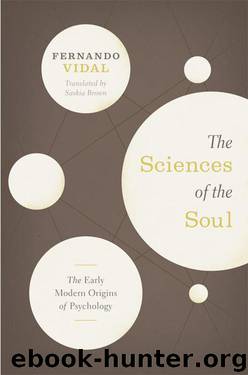The Sciences of the Soul: The Early Modern Origins of Psychology by Vidal Fernando

Author:Vidal, Fernando [Vidal, Fernando]
Language: eng
Format: epub
Publisher: University of Chicago Press
Published: 2011-12-01T03:00:00+00:00
If we lay eyes on a person we have never seen before, but who has certain features in common with someone we have loved, . . . we will feel goodwill and interest stirring in our soul, whose cause we probe in vain. . . . We can no longer give the name of sympathy to the vague liking, the indeterminate inclination of one sex for the other, no more than to the feeling that makes us desire refreshing drinks in the heat of summer. 76
In this exploration of the psychological phenomenon of sympathy, physiological reductionism and moral considerations (also present in the articles on habit) are replaced by an associationist analysis. 77
Mingard attached the article RÊVE only to anthropology—perhaps by oversight, given the strongly psychological character of the subject. In the Paris Encyclopédie, RÊVE (dream) is defined in a very short article as “a dream [songe] one has while sleeping.” A better knowledge of the subject is needed “not only in medicine but also in metaphysics, due to the objections of the idealists” in any case, “all the objects of dreams are clearly tricks of the imagination.”78 A second article, medical, explains how dreams serve in diagnosis and prognosis: stormy seas, for example, “foretell stomach upsets.” The article reflects the most classical humoral theory,79 and indeed, it was taken from the Dutchman Jodocus Lommius’s Medicinalium obser-vationum, which was published in 1560 but went through new editions and translations right up to the second half of the eighteenth century. Mingard, by contrast, discusses dreams in a psychological framework, as products of “memory, imagination, and the association of ideas.”80
The articles on rÊve are linked to those on songe. Under SONGE (Métaphysique & Physiologie), the Yverdon Encyclopédie reproduces the Paris article, which deals more with the bodily sensations and neurophysiology of dreams than with psychological mechanisms. In the Encyclopédie, other articles explore “venereal dreams” (in medicine), as well as dreams in biblical criticism, mythology, poetry, and modern history (in North Americans’ “dream festivals”). The Yverdon Encyclopédie reproduced only the article on biblical criticism, in which Oriental sages are said not to claim their dream interpretations are divinely inspired, and in which internal textual contradictions are evoked to cast doubt on the divine origin of Daniel’s interpretation of Nebuchadnezzar’s dream (Daniel 2). 81 Mingard set out to refute this. The scriptures, he explained, clearly show that God used dreams to reveal himself, either directly (as when Joseph was instructed to take Mary as his wife), or through an interpreter. But prophetic dreams, like miracles, are no longer necessary. 82 “The claim by some superstitious persons that God reveals himself to them in dreams [songes] is therefore unfounded.”83 In short, Mingard restricted songe to prophetic dreams, thus effectively isolating it and confining the question of dreams (rêve) to the psycho-anthropological field.
Overall, the Yverdon Encyclopédie sought to go beyond anatomy and physiology in order to grasp the specifically anthropological dimension of phenomena such as apathy, sympathy, habit, and dreams through their psychological mechanisms. Its reform
Download
This site does not store any files on its server. We only index and link to content provided by other sites. Please contact the content providers to delete copyright contents if any and email us, we'll remove relevant links or contents immediately.
Enlightenment Now: The Case for Reason, Science, Humanism, and Progress by Steven Pinker(7306)
A Journey Through Charms and Defence Against the Dark Arts (Harry Potter: A Journey Through…) by Pottermore Publishing(4811)
The Immortal Life of Henrietta Lacks by Rebecca Skloot(4581)
A Journey Through Divination and Astronomy by Publishing Pottermore(4379)
Elon Musk by Ashlee Vance(4122)
Origin Story: A Big History of Everything by David Christian(3687)
COSMOS by Carl Sagan(3618)
Alchemy and Alchemists by C. J. S. Thompson(3516)
Bad Pharma by Ben Goldacre(3422)
Enlightenment Now by Steven Pinker(3367)
Shadow of Night by Deborah Harkness(3361)
Inferior by Angela Saini(3311)
A Mind For Numbers: How to Excel at Math and Science (Even If You Flunked Algebra) by Barbara Oakley(3302)
Origin Story by David Christian(3195)
The Code Book by Simon Singh(3181)
Signature in the Cell: DNA and the Evidence for Intelligent Design by Stephen C. Meyer(3132)
The Elements by Theodore Gray(3051)
A Brief History of Time by Stephen Hawking(3022)
A Journey Through Potions and Herbology (A Journey Through…) by Pottermore Publishing(2851)
